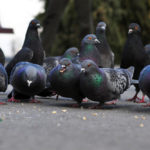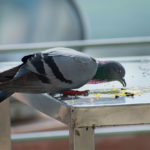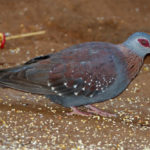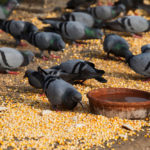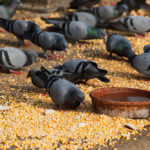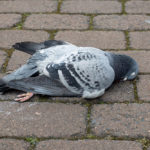When we think of pigeons, we tend to think of them as the feathery fiends who won’t leave us alone as we’re trying to enjoy our lunch break in the park.
They are notorious for pecking around picnic benches looking for leftover sandwich crusts (any flavor goes), and for pestering us as we sit outside cafes,cooing for crumbs.
The internet is full of videos and memes showing pigeons eating french fries on the sidewalk, kebabs down the back alley and burgers from the box.
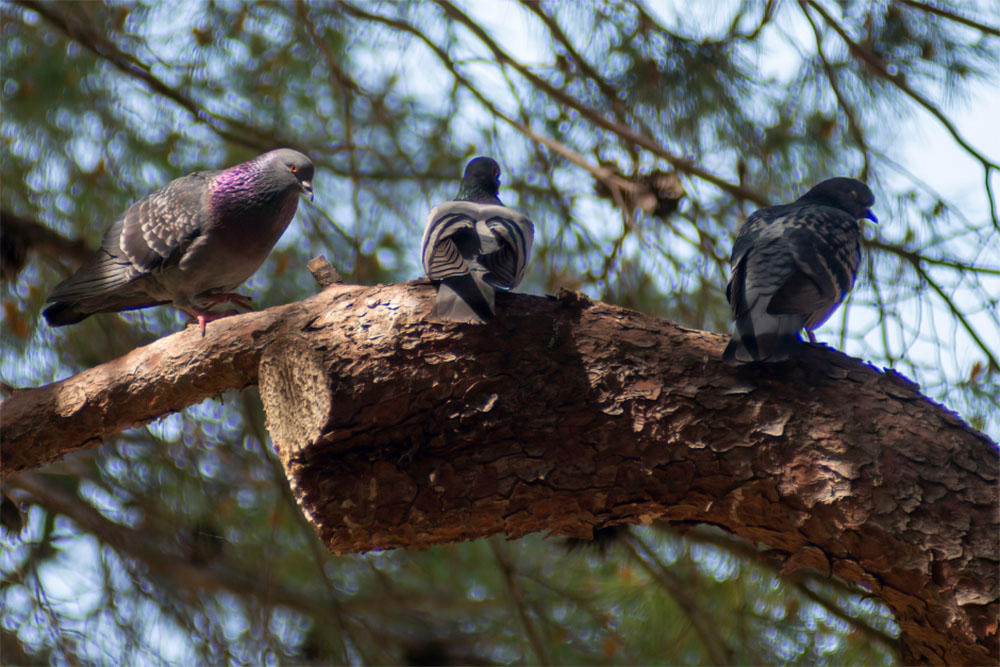
So, it is no wonder that we think of these birds as the walking trash cans of the animal kingdom!
It seems like they really will eat anything, but is that actually the case, or is it simply necessity that causes these birds to binge on fast food?
Of course, many people keep pigeons as pets as they are fantastic for racing and training.
Pigeons have in fact been domesticated for over 6,000 years and make famously loyal and engaging companions to humans.
Which is why it is so important to know what to feed them to keep them healthy and happy.
Most pigeon owners aim to mimic the conditions and behaviors that pigeons would experience in the wild as closely as possible, however this does not mean that they should be fed leftover Chinese takeout.
In actual fact, pigeons have more selective dietary needs than we realise, and those birds that live in less urban settings would most certainly turn their beaks up at much of what their city-dwelling cousins consume.
And although urban pigeons do eat almost anything, it doesn’t mean that it is good for them.
So what should pigeons be eating, and what do they eat in the wild? Let’s get stuck in!
What Do Wild Pigeons Eat?
Wild pigeons have a much more healthy and nutritious diet than their urban cousins, but this is only because there tends to be more fresh fruit, berries and grains available in the wild than there are in cities.
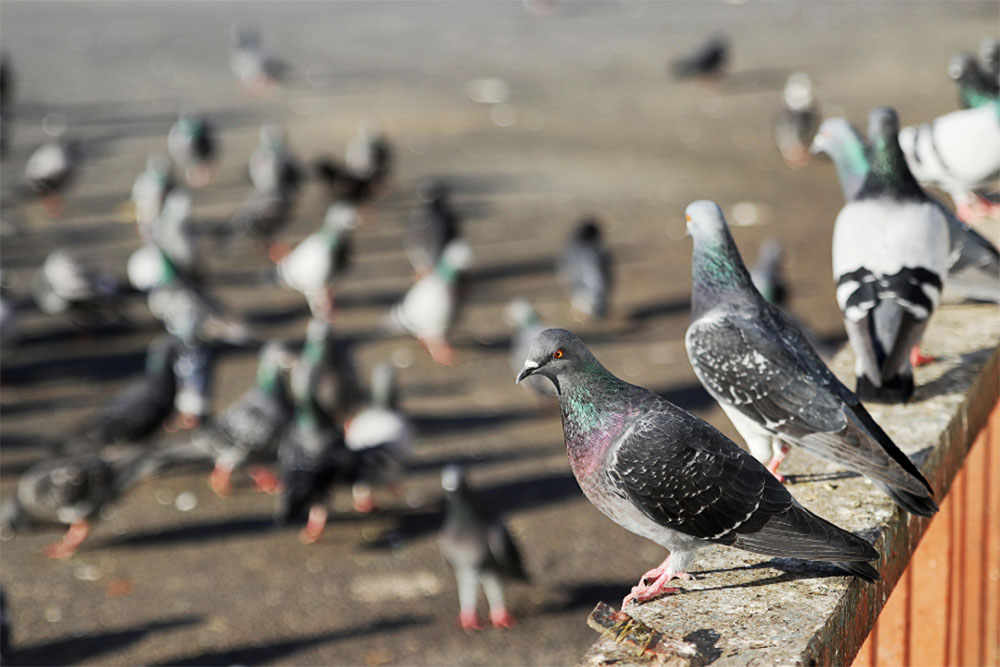
Their anatomies are no different from that of urban pigeons, however their diets vary according to where they live and what is available to them.
Pigeons are incredibly adaptable creatures. They have managed to settle in almost every continent on the planet, and in every type of habitat.
Different species of wild pigeons can be found in Europe, Africa, Asia, the Middle East, the Americas and Australasia, and can even be found on remote islands in the middle of the Atlantic ocean!
In fact, the only places that these guys haven’t colonised are the Antarctic, Arctic and the Sahara Desert.
So as you can imagine, their diets are very different depending on where they live.
In general however, wild pigeons live in forest environments or coastal environments and they have adapted to eat accordingly.
Different species of wild pigeons fall into two key dietary categories, and these are:
- Granivores – eat seeds and grains mainly
- Frugivores – eat fruit and berries mainly
Pigeons that are granivores tend to eat a diet of seeds and grains, along with anything else that they can find on the floor.
It tends to be species of pigeons that are terrestrial or semi-terrestrial in nature who are granivore, meaning they spend most of their time on foot at ground level and even make their nests on the ground too.
These pigeons can live in forests or coastal areas.
If they are very hungry they can eat insects, worms and even small reptiles like lizards, which they also find on the ground.
Pigeons that are frugivores tend to be arboreal in nature.
This means that they spend most of their time in trees and canopies and like to eat the berries, fruit and nuts that the trees provide.
Some of these pigeons have even adapted to be able to hang upside down from branches in order to reach the fruit and berries more easily!
They eat the entire fruit, skin and all, and are not fussy about what fruits they choose.
These pigeons can live in tropical rainforests, mangroves and woodlands, and will also eat insects and fruit flies if they get hungry.
As you can see, whether they are terrestrial, semi-terrestrial or arboreal, wild pigeon species are all very similar in their ability to eat whatever they can get their beaks on if they are hungry enough.
However, they tend to eat fruits, grains, seeds and berries most readily, and they can also eat insects, worms and lizards when necessary.
Like their urban cousins, wild pigeons are well adapted and robust and their digestive systems can withstand most food types.
What Do Urban Pigeons Eat?
Urban pigeons have adapted to live very comfortably in our towns and cities and they are in fact so successful at it that many people consider them a pest.
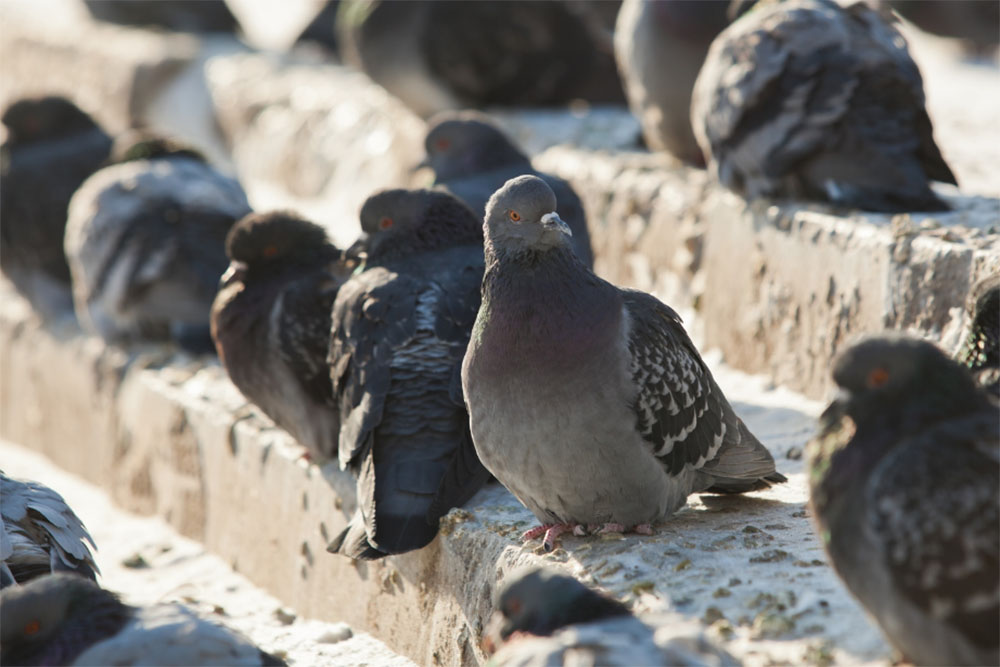
Great flocks of pigeons can be found in squares and plazas across the globe, and we are very familiar with seeing them lined up on rooftops and perched on statues and monuments in our town centers.
The reason that these pigeons love to live alongside humans is that we create so much food waste for them to eat.
Urban pigeons will eat grains and breadcrumbs thrown to them in the park, and will also scavenge in trash cans and waste bins in order to pluck out leftovers.
Food items that urban pigeons have been known to eat include:
- Meat and fish (in the form of burgers, kebabs and sandwich fillings)
- Carbohydrates (in the form of bread, pastries, pasta and rice)
- Confectionary (in the form of chocolate bars, sweets and other junk foods)
- Fruit and vegetables (salads and fruit that has been thrown out)
Their digestive systems have adapted to be able to cope with many of these food types, however there are still many dangers that come with eating human leftovers.
Here are some examples of foods that are not good for pigeons to eat:
- Salt – Pigeons have great difficulty digesting sodium and should therefore not eat salt or foods that have a high salt content. Unfortunately , much of our fast food and junk food contains extremely high salt levels, like french fries and fries, and these foods can make pigeons very unwell as a result.
- Sugar – Pigeons also have trouble digesting high levels of refined sugars, and although they can cope with the natural sugars that occur in fruit and berries, chocolate, cakes and sweet pastries are just some of the human foods that pigeons eat which make them ill. If pigeons consume sugary drinks like coca cola they can even develop diabetes.
- Apples – Although it is fine for pigeons to eat the skin and body of an apple, the seeds contain cyanide and can cause the birds to become very unwell if consumed.
- Avocados – It may seem strange, but avocados actually contain a substance called persin which is poisonous to pigeons.
- Chocolate – As well as containing dairy, which is not great for pigeons, chocolate also contains something called theobromine which can be fatal to pigeons if eaten.
- Chemicals and Pesticides – Whilst wild pigeons can enjoy eating fruit and berries as much as they like, urban pigeons are often in danger of ingesting man-made pesticides and chemicals when they eat the fruit grown for human consumption. These chemicals are not ideal for humans, but they can be very harmful to birds and can be fatal if eaten too regularly.
- Bacteria and mould – Sadly, much of the food that urban pigeons eat is rotten and contaminated. Trash cans and sidewalks are breeding grounds for bacteria and mould and, as a result, pigeons can become very ill from eating contaminated foodstuffs.
As you can see, although urban pigeons are well adapted and very unfussy when it comes to their dietary needs, they are also vulnerable to many dangers.
It is best to think twice before tossing them your leftovers as you might actually be causing more harm than good.
If you see a pigeon looking hungry, it is far kinder to feed them clean grains, berries, seeds or fruit.
What Do Baby Pigeons Eat?
Contrary to popular belief, baby pigeons don’t actually eat worms.
In fact, baby pigeons are fed a substance called crop milk by their parents, which contains all the nutrients and sustenance they need to grow and develop.
Both male and female pigeons produce this substance in their crop, a fleshy sack situated between the pigeon’s throat and chest.
The crop milk is partially digested liquid, and the parent administers it to the chick directly from its own throat.
The mum or dad pigeon are able to open their beaks wide enough so that the baby pigeon can dip their own beak in and take on the crop milk.
Baby pigeons are fed only this milk for the first week of their lives.
As they begin to grow however, their parents start to mix the crop milk with semi solid food, just as we humans ween our babies off breast milk.
Baby pigeons will gradually consume more mushy fruits and berries alongside their crop milk, until eventually they don’t need the crop milk at all and are only on solids.
This can take up to 6 weeks, and only once they are on solids can the little squabs leave their parents’ nests.
What Should Domestic Pigeons Eat?
If you are hand-rearing a baby pigeon as a domestic pet then you should look to mimic the dietary development that its parents would provide in the wild.
Most pet stores sell a special baby pigeon hand-rearing formula that is very similar to crop milk.
This formula can be administered using a plastic syringe to replicate the way a parent pigeon would feed its young.
The formula should gradually be thickened as the baby pigeon grows, until it is a semi-solid, mushy consistency. Then the baby pigeon can be transferred onto an adult diet.
Adult domestic pigeons can be fed a large array of foods but it is important that they are clean and healthy options not human leftovers or junk food.
Seeds, grains, nuts and berries always go down well with pet pigeons, and they also love fruit, just be sure that the skin is washed and doesn’t have any chemicals or pesticides on it. Pale vegetables such as celery and lettuce are fine for pigeons to eat but do not contain many nutrients.
They are largely made of water so should be balanced with more nutritious alternatives.
Pigeon pellets are a great option because they have been especially designed to contain all the vitamins and minerals that your pigeon needs.
It is fine to feed your pigeon rice, it won’t harm them but it isn’t actually healthy either so is best avoided. And remember – do not feed your pigeon avocado as it is toxic for them!
If you feed your domestic pigeon a healthy and balanced diet which does not contain salt, refined sugars or nasty chemicals, it is possible they will live for between 10 and 15 years!
Conclusion
Pigeons are a fascinating family of birds that have managed to adapt to almost every environment on the planet.
Their dietary habits are broad and vary according to where they live and what is available to them.
What unites all pigeon species is their ability to eat almost anything if they are hungry.
Pigeons can eat insects, worms, lizards, hamburgers, french fries or christmas pudding if they are desperate enough – but this does not mean that they should eat those things.
Ideally, all pigeons, wild, urban, or domestic, should stick to a healthy diet of grains, seeds, nuts, fruit and vegetables so that they can live long and happy lives.

